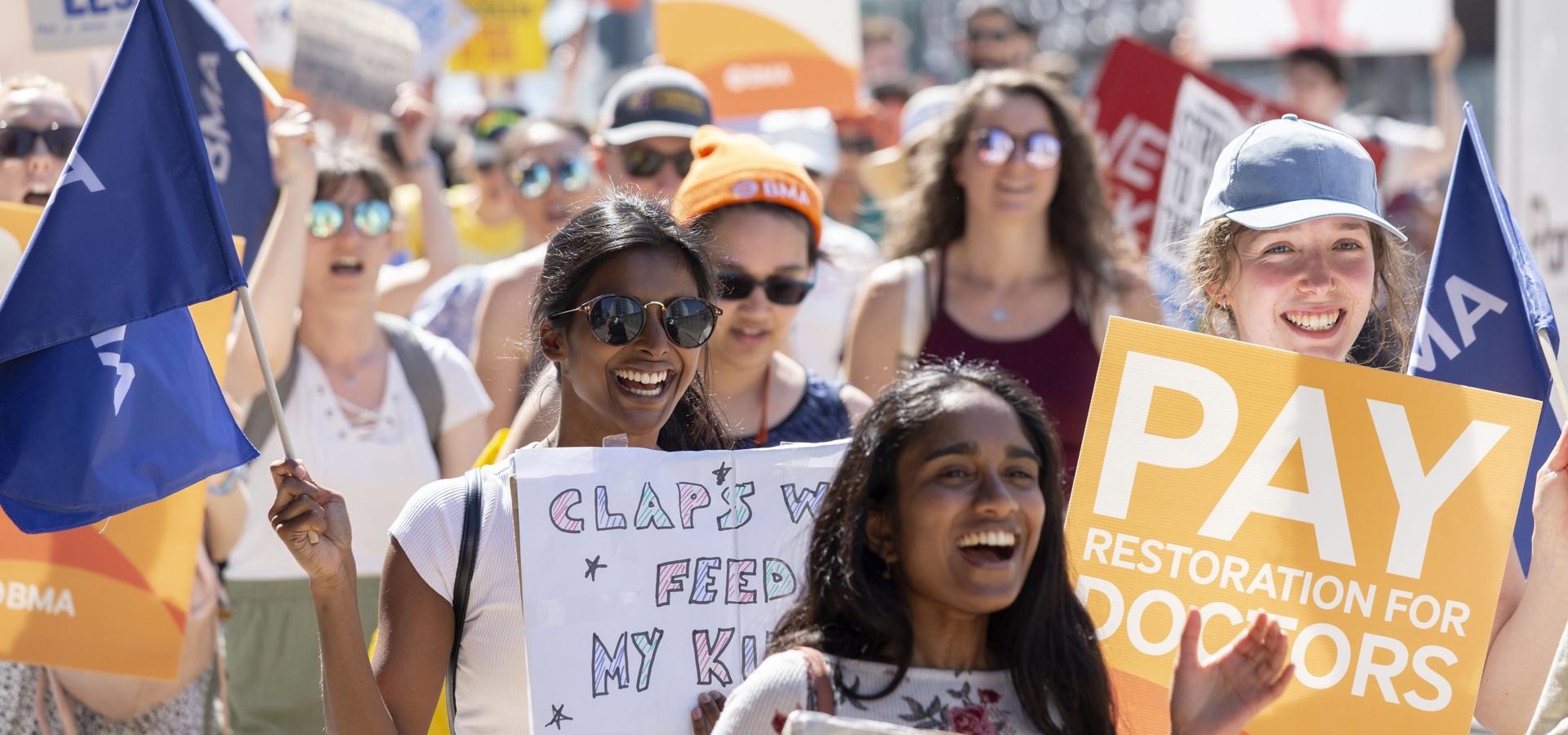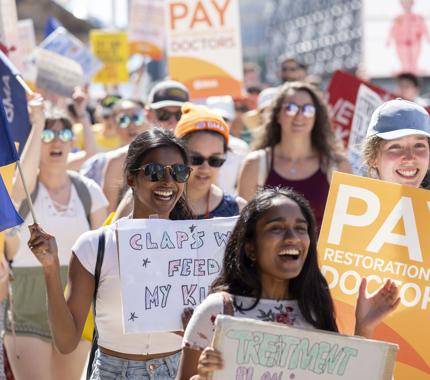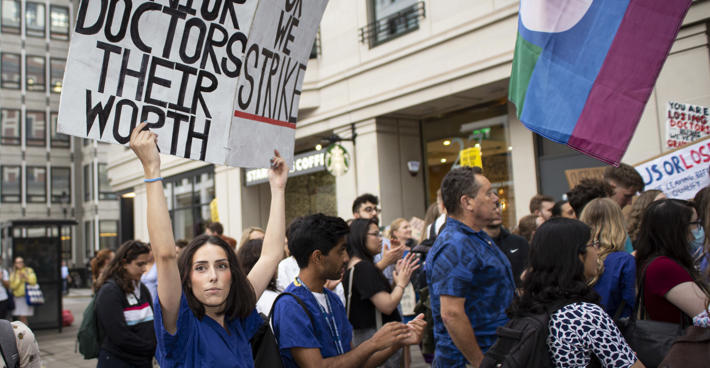Pay offer for resident doctors in England - It's a YES
Resident doctors in England have voted Yes to accept the pay offer from the Government.
69.22% of those eligible to cast a vote in the referendum voted.
The votes have been tallied and you have voted 65.97% to 34.03% ACCEPT the Government’s offer.
We will update you soon about what happens next.
Our strategy into 2025 and beyond
Now the offer from government has been accepted, our campaign for full pay restoration still continues. It is likely that journey involves further industrial action, but when remains to be seen, and we must be prepared for the fight ahead. We have always wanted members to feel informed and part of the conversation about what happens next. Read our ‘bank and build’ strategy for the coming months.
Review into BMA exception reporting survey
As part of the recently agreed deal with the Government, there will be a review into exception reporting processes for resident doctors. To make this important review a success, we want to hear about your experiences with the current system through a short survey. The more responses we receive, the more evidence we’ll have when working with the Government to make improvements.
Please complete the survey by 7 October and share the link with colleagues on WhatsApp so we reach as many doctors as possible.
Why resident doctors were taking industrial action
While workload and waiting lists are at record highs, resident doctors’ pay has been cut by more than a quarter since 2008.
A crippling cost-of-living crisis, burnout and well below inflation pay rises risk driving hard working doctors out of their profession at a time when we need them more than ever. If resident doctors are forced out of the NHS because of poor pay and conditions, the services we all rely on to look after our loved ones will suffer.
Real life stories

Enough is enough
The Doctor has spoken to a range of resident doctors about industrial action.
In a series of interviews, Ben Ireland and Tim Tonkin speak to:
- Foundation year 1 Daniel Zahedi
- Foundation year 2 Vanya Gurr
- Foundation year 2 Alistair Ludley
- Foundation year 2 Vassili Crispi
- Registrar Ellen Newberry
- ST2 Priyesh Parekh
- ST3 GP registrar Ayesha Shafaq:
- ST4 registrar Kerrie Thackray
- Core surgical trainee Roshan Rupra
How we got here

Our calculations show that pay awards for resident doctors in England have delivered a real terms (RPI) pay cut.
Resident doctors in England were guaranteed a 2% pay rise in 2022/23, as part of the multi-year pay deal agreed in 2019. This contract also brought an additional £90 million investment and many significant improvements on the 2016 contract.
From our perspective, the deal provided a guarantee of annual uplifts that were higher than those seen since 2008, in the context of an uncertain time due to the potential impacts of an impending Brexit. 82% of junior doctor members who voted in the referendum on the new contract, agreed to accept them.
However, the contract was agreed before the pandemic started and when inflation was below 2%. Our new calculations show that pay awards for junior doctors in England from 2008/09 to 2021/22 have delivered a real terms (RPI) pay cut of 26.1%, even accounting for total investment secured through the multi-year pay deal agreed in 2019.
Resident doctor pay analysis methodology - September 2022
Resident doctor pay restoration costing analysis methodology - January 2023

The DDRB themselves state that not applying pay award would have a significant impact on retention and more.
Doctors in training in England were once again excluded from the pay award process because their contract is still subject to a multiple-year pay deal, awarding them 2% for 2022/23.
This is in spite of the Framework Agreement for the 2018 contract negotiations, which established the current pay deal, explicitly stating that the DDRB is able to make further pay recommendations or observations on behalf of resident doctors in England where requested (8.1). They once again decided that because this group was not included in the UK Government's remit letter, they are unable to make formal recommendations on their behalf, allowing the UK Government to disregard them altogether.
While the 4.5% uplift would in any case be unsatisfactory, amounting to a likely 6% pay cut in the face of spiralling inflation, to exclude resident doctors in England from the award given to other NHS workers is nothing less than a betrayal of the profession.
As the DDRB themselves note, a decision not to apply an award to groups subject to a pay deal will have 'a significant effect on motivation, affecting retention, productivity, and ultimately patient care'. They actively state that the headline increase of 2%, set as part of the current deal, is 'likely not sufficient' to address those issues.

The resident doctors committee has escalated our campaign on pay.
Since early 2022, the RDC (resident doctors committee) has escalated our campaign on pay to challenge the government to make a fair pay award for NHS resident doctors this year, that addresses the long term pay erosion our members have faced.
RDC also made the decision to withdraw from the DDRB process this year for resident doctors in England in response to concerns over the body's effectiveness and independence from Government.
Watch our webinars
International doctors
This webinar aimed at international doctors, explains the visa constraints when taking industrial action.
Watch the Visas and industrial action webinar
BMA activists
The following two webinars for BMA members, are aimed at activists to explain how we got here and how you can help build a movement.
BMA members - sign in to watch the webinars
As of 18 September, all references to junior doctors in BMA communications have been changed to ‘resident doctors’.
Making up nearly 25% of all doctors in the UK, this cohort will now have a title that better reflects their huge range of skills and responsibilities.
Find out more about why junior doctors are now known as 'resident doctors'.





